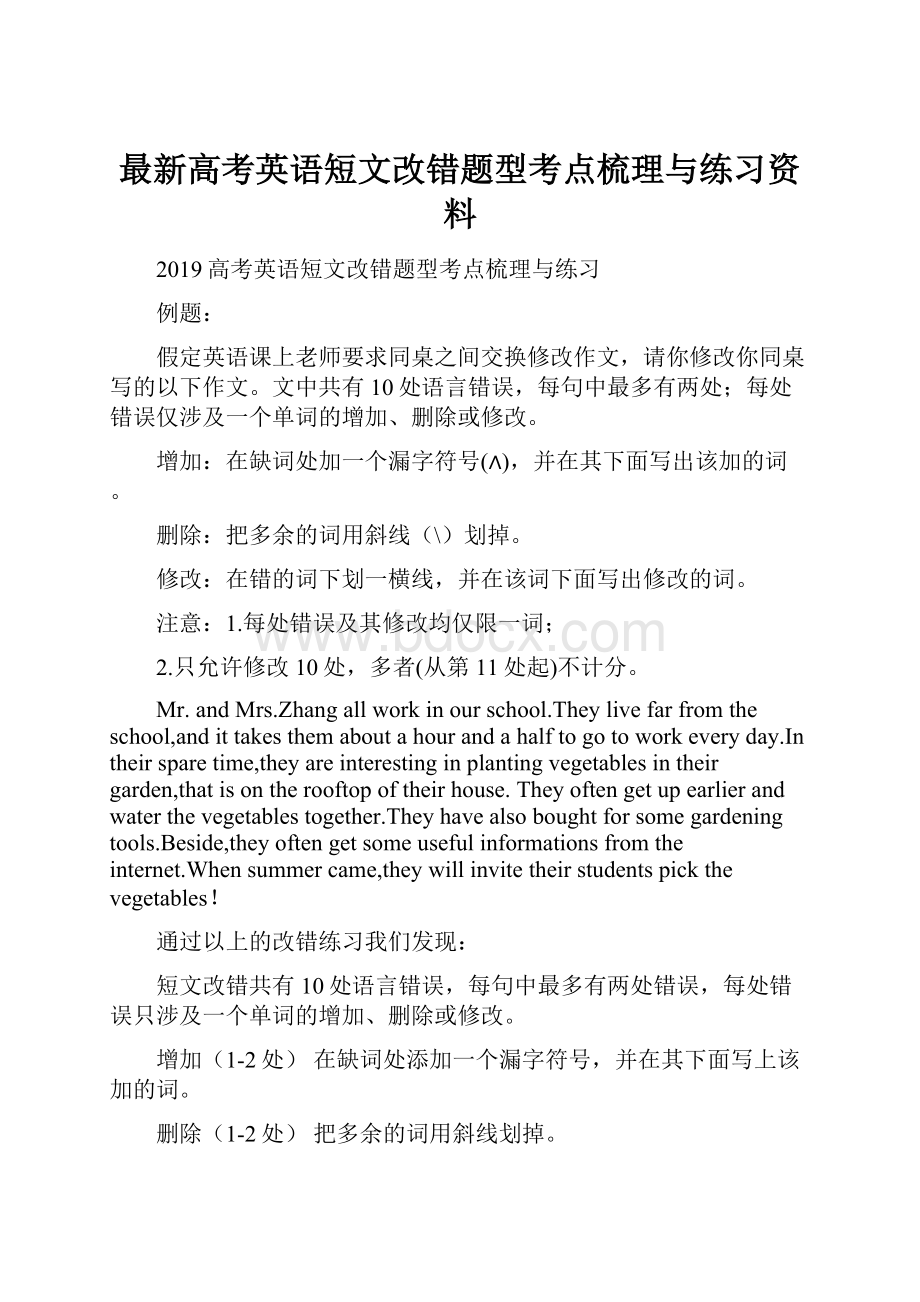最新高考英语短文改错题型考点梳理与练习资料Word下载.docx
《最新高考英语短文改错题型考点梳理与练习资料Word下载.docx》由会员分享,可在线阅读,更多相关《最新高考英语短文改错题型考点梳理与练习资料Word下载.docx(16页珍藏版)》请在冰豆网上搜索。

5.Goodhealthisapersonmostvaluablepossession.
名词的格的误用。
(1)根据句意,
(2)注意形式:
’s(单数)s’(复数)
相关练习题:
1.Every
year
many
tourist
come
here
to
enjoy
its
beautiful
scenery
and
rich
culture.
2.Throughtheprogram,welearnedtouseknowledgegainedinclasstosolveproblem.3.
Nowadays
with
modern
life
going
rapidly,
people
suffer
from
different
kind
of
diseases,
both
mentally
physically.
4.I’d
like
give
you
some
advices
on
how
learn
Chinese
well.
5.On
arainy
day
I
was
walking
home
one
my
friend,
a
truck
came
stop
beside
us.
6.Politewordsareoneoftheexample.
7.Of
course,it’s
stronglyprohibited
tobuyorsell
anythingmade
antelopesfur.
8.ShetoldmethatIdidn'
tneedtoworryaboutmakingmistakesbecauseIcouldfindoutmyshortcomingsthroughmymistake.
9.OfallthebookIhaveread,Chickensoupforthesoulismyfavorite.
10.EveryonepraisedAhBaoforhisbraveandkindness.
考点二:
动词
1.WhenIwasachild,Iihopedtoliveinthecity.IthinkIwouldbehappythere.
2.Afterlooksatthetoyforsometime,heturnedaroundandleft.
通过以上,我们发现动词的考查有两种方式:
谓语动词和非谓语动词。
(一)谓语动词的考查
1.AsItellyoulasttime,Imadethreenewfriendshere.
2.Manyoverpasseshavesetup,soithasbecomeveryconvenientforpeopletotravel.
3.Mydreamschoollooklikeabiggarden.
谓语动词会考查时态、语态、主谓一致三个方面。
时态:
一般现在时do/does(sometimes,oftenusually,........)
一般过去式did(yesterday/lastyear......./......ago)
一般将来时willdo/am,isaregoingtodo/am,isareabouttodo(tomorrow,/nextyear......)
现在进行时am/is/aredoing
过去进行时was/weredoing
现在完成时has/havedone(lately/recently/sofar/uptonow/untilnow/inthefewyears/since)
过去完成时haddone
过去将来时woulddo
判断句子的时态:
(1)根据时间状语来决定,
(2)上下文的时态,(3)从句中时态体一致,(4)根据句意
语态:
主动语态与被动语态的误用(删除be或添加be或改变时态)
被动语态:
一般现在时am/is/aredone一般过去时was/weredone
一般将来时willbedone现在进行时am/is/arebeingdone
过去进行时was/werebeingdone现在完成时has/havebeendone
过去完成时hadbeendone
主谓一致:
找准主语和谓语动词,判断两者人称和数是否一致。
(1)主谓不一致就近原则:
therebe,or,notonly....butalso,neither.....nor....
就远原则:
with,alongwith,aswellas,ratherthan
定语从句中的主谓一致:
与先行词保持一致
manya+n,morethan+n,each,every谓语用单数
anumberof/thenumberof
(2)第三人称单数形式的错用:
看主语是否为第三人称单数;
是否为doing或todo作主语:
是否为从句作主语
(3)缺少动词,特别是be动词,注意therebe句型
相关练习:
1.
Mydreamschoolstartsat8:
00amandendsat3:
00pm.Theyarethreelessonsinthemorningandtwointheafternoon.We
didn’t
need
do
so
much
homework.
Therefore,
we
have
more
time
after-schoolactivities.
2.Lots
studies
been
shown
that
global
warming
has
already
become
very
serious
problem.
3.We
must
found
ways
protect
our
environment.
4.Tony
scared
begun
cry.
5.A
woman
saw
him
crying
telling
wait
outside
the
shop.
6.
In
mornings,
it
full
students
exercising.
The
view
back
classroom
is
also
splendid.
Close
school
there
park
trees
around
it.
7.My
mum
makes
best
biscuits
in
world,
decide
ask
her
for
help.
Mum
taught
me
basic
steps
of
baking.
insisted
doing
most
baking
myself.
8.Then,italsohelptowatchTVandreadbooks.
9.
If
are
me,would
talk
him?
10.Since
then
---
all
these
years
had
allowing
tomatoes
self-seed
where
they
please.
(二)非谓语动词的考查
考点:
主要考查非谓语动词的判定及形式的选择。
回忆:
非谓语动词如何判定
非谓语动词的形式:
todo目的,将来,主动tobedone将来,被动
doing进行,主动beingdone进行;
被动
done完成,被动havingdone完成,主动havingbeendone完成,被动
具体考点:
1.动名词作主语(动词作主语,通常用doing的形式,注意主谓一致)
2.介词+doing作宾语(常见介词:
on,in,at,of,for,about,with,without,after,before等)
3.And连接的不定式或动名词前后不一致(根据语境或语义进行调整)
4.作定语、状语时的主动被动关系(找准逻辑主语)
doing和done之间的转化,havingdone和havingbeendone之间的转化
5.todo不定式to的删除与添加(使役动词加不带to的不定式,在被动语态中还原to)
6.固定搭配:
跟todo形式的词:
decide,learn,want,plan,manage,pretend,offer,promise,agree等
跟doing形式的词:
avoid,enjoy,mind,imagine,appreciate,lookforwardto,insiston,can’thelp等
1.WhenIwasachild,Ispentmorethantenyearslearntheviolin.
2.Hebecamemyfirstguitarteacher.Ittookmesuchalongtimechooseaguitaramongseveralwonderfulmodels.
3.IwonthefirstprizeintheEnglishspeechcompetitionholdinourschoollastyear.
4.Dressinginallpinkfromheadtotoe,hewassingingasongwhichsoundedlikeakid’ssong.
5.Uponyourarrival,therewillbeapartyforyouorganizingbymyclassmates.
6.Thankyousomuchfornotonlygivingmelife,butalsoteachmehowtobeagoodperson.
7.SoonDad’sfriendscametoourrescue,restartourcarwithnewbatteries.
8.Makeaspeechusedtobeabigproblemforme.
9.Droppedthethingshehadboughttotheground,heranawayrapidly.Howdangerousitwas!
10.Havingbeenseenthefilm,everyonewasdeeplymoved.
考点三:
形容词和副词
1.I’mverytiring.
注意v-ed和v-ing形式的形容词的用法,
-ed修饰人,-ing修饰物
2.Theglobalwarminghasbecomeaveryseriouslyproblem.
3.Wecanhearbirdssinginghappyallround.
词性的误用
用adj.的情况:
(1)形容词修饰n
(2)be+adj.(3)感官动词(feel,taste,sound,smell,look)+adj.
(4)联系动词+adj.(keep,stay,remain,become,turn)
(5)adjandadj(6)adv.+adj.
用adv.的情况:
(1)adv.修饰v.adj,adv.
(2)adv.放在句首或句末
(3)并列adv.(4)adv.单独使用(however,moreover,besides,otherwise......)
1.IlearnedthatIhadtobemorepatientandlittleaggressive.
形容词和副词的比较级和最高级
用比较级的情况:
(1)比较级+than
(2)比较级and比较级
(3)否定式+比较级=最高级(4)the+比较级+主谓,the+比较级+主谓
用最高级的情况:
(1)the+最高级
(2)oneofthe+最高级
1.Recentstudiesshowthatwearefarmoreproductiveatworkifwetakebreaksregular.
2.He
liked
verymuch
he
quickly
walkedintotheshop.
3.Mom
said,“How
nice
see
again!
DadandIwereterribleworried.”
4.On
left-hand
side
class,Icouldeasysee
footballfield.
5.
thebakingmyself.
thoughtthebiscuitswerereallywell.
6.Nearly
five
before,
help
father,
sisterand
grew
cherry
tomatoesin
garden.
7.My
better
theworld.
8.We
growing
wonderfullytomatoesatnocost!
9.The
teachers
kindandhelpfully.
10.I
noticed
thecarriage
wasnoiseandfilledwithpeople.
考点四:
连词
1.Wetriedtofixitandtherewasnothingwecoulddo.
2.Hefoundwherehisparentsweremissing.
通过以上可知连词的考查分为并列连词和从属连词。
(一)从属连词:
定语从句/名词性从句/状语从句(主要考查引导词的选择)
(1)定语从句:
修饰名词和代词的从句,分为限制性和非限制性
引导词:
that,which,who,whom,whose,as,when,where,why
(2)名词性从句:
从句在整个句子中充当名词的作用
分类:
主语从句:
从句作主语;
it作形式主语
宾语从句:
跟在vt和介词之后的从句;
it作形式宾语
表语从句:
跟在系动词之后的从句
同位语从句:
解释说明名词和代词的从句
that,whether/if,what,who,which,whom,whose,when,where,whyhow以及+ever
(3)状语从句:
常用引导词:
when,while,if,unless,before,after,once,since,for,sothat,incase,aslongas,until,evenif等
常考句型:
(1)bedoing......when....
(2)beabouttodo.......when.....(3)hadjustdone......when
(4)nosooner....than(5)hardly/scarcely..........when\before
(二)并列连词:
andbutor的相互转化
(1)根据句意选择;
(2)根据并列连词词组选择
notonly......butalso.....not......but......neither....nor....either.....or.........aswellas
需要注意:
(1)两个连词不能同时使用,如andso.
(2)两个句子不能都用连词。
(3)只有一个句子时不能用从属连词。
(4)although/but不连用,because/so不连用。
1.Infact,Idon'
tliketogoanymore,andI'
mafraidI'
lllosetheirfriendship.
2.Assoonaswearrived,sowedroppedthelinesintothewater.
3.Itissocoldthatyoucan'
tgooutsideiffullycoveredinthickclothes.
4.Ifyoumissthischance,itmaybeyearssinceyougetanotherone.
5.Actually,theLondonOlympicParkisbuiltwhereverthereusedtobeapoorareacalledEastLondon.
6.Mysuggestionisweshouldhaveadiscussionaboutthismatterinsteadofjustlyingitaside.
7.Wearethinkingaboutwhomcanbeadmittedintoourclub.Thenumberofmemberislimited.
8.Shelistensattentivelyandtriestocatcheverythingwhichtheteacherssayinclass.
9.Apassengerrealizedhecouldn'
tfindhisticketbutbecamequiteupset.
10.Astimewenton,IrealizedwhatridiculousIhadbeenatthattime.
11.Herperformancesonthestagewereperfect,thatmadealotofpeopleadmireher.
12.Weallconsiderimportantthatchildrenshouldtakeplentyofmilkastheygrow